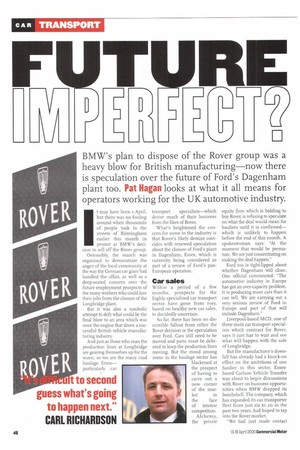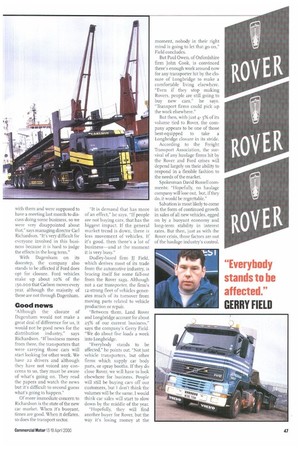t may have been i April, but there was no
Page 48

Page 49

If you've noticed an error in this article please click here to report it so we can fix it.
fooling around when thousands of people took to the streets of Birmingham earlier this month in protest at BMW's decision to sell off the Rover group.
Ostensibly, the march was organised to demonstrate the anger of the local community at the way the German car giant had handled the affair, as well as a deep-seated concern over the future employment prospects of the many workers who could lose their jobs from the closure of the Longbridge plant.
But it was also a symbolic attempt to defy what could be the final blow to an area which was once the engine that drove a successful British vehicle manufacturing industry.
And just as those who man the production lines at Longbridge are gearing themselves up for the worst, so too are the many road haulage firms— particularly car transport specialists—which derive much of their business from the likes of Rover.
What's heightened the concern for some in the industry is that Rover's likely demise coincides with renewed speculation about the closure of Ford's plant in Dagenham, Essex, which is currently being considered as part of a review of Ford's panEuropean operation.
Car sales
Within a period of a few months, prospects for the highly specialised car transport sector have gone from rosy, based on healthy new car sales, to decidedly uncertain.
So far, there has been no discernible fallout from either the Rover decision or the speculation over Ford. Cars still need to be moved and parts must be delivered to keep the production lines moving. But the mood among some in the haulage sector has blackened at the prospect of having to carve out a new corner of the mar ket in the face of intense competition. Alchemy, the private equity firm which is bidding to buy Rover, is refusing to speculate on what the deal would mean for hauliers until it is confirmed— which is unlikely to happen before the end of this month. A spokeswoman says: "At the moment that would be premature. We are just concentrating on making the deal happen."
Ford too is tight-lipped about whether Dagenham will close. One official commented: "The automotive industry in Europe has got an over-capacity problem. It is producing more cars than it can sell. We are carrying out a very serious review of Ford in Europe and part of that will include Dagenham."
Liverpool-based MCD, one of three main car transport specialists which contract for Rover, says it just has to wait and see what will happen with the sale of Longbridge.
But the manufacturer's downfall has already had a knock-on effect on the ambitions of one haulier in this sector. Essexbased Carlson Vehicle Transfer was about to begin discussions with Rover on business opportunities when BMW dropped its bombshell. The company, which has expanded its car transporter fleet from just six to 20 in the past two years, had hoped to tap into the Rover market.
"We had just made contact with them and were supposed to have a meeting last month to discuss doing some business, so we were very disappointed about that," says managing director Carl Richardson. "It's very difficult for everyone involved in this business because it is hard to judge the effects in the long term."
With Dagenham on its doorstep, the company also stands to be affected if Ford does opt for closure. Ford vehicles make up about to% of the 150,000 that Carlson moves every year, although the majority of these are not through Dagenham.
Good news
"Although the closure of Dagenham would not make a great deal of difference for us, it would not be good news for the distribution industry," says Richardson. "If business moves from there, the transporters that were carrying those cars will start looking for other work. We have 22 drivers and although they have not voiced any concerns to us, they must be aware of what's going on. They read the papers and watch the news but it's difficult to second guess what's going to happen."
Of more immediate concern to Richardson is the state of the new car market. When it's buoyant, times are good. When it deflates, so does the transport sector "It is demand that has more of an effect," he says. "If people are not buying cars, that has the biggest impact. If the general market trend is down, there is less movement of vehicles. if it's good, then there's a lot of business—and at the moment it is very busy."
Dudley-based firm JJ Field, which derives most of its trade from the automotive industry, is bracing itself for some fall-out from the Rover saga. Although not a car transporter, the firm's 52-strong fleet of vehicles generates much of its turnover from moving parts related to vehicle production or repair.
"Between them, Land Rover and Longbridge account for about 25% of our current business," says the company's Gerry Field. "We do about five loads a week into Longbridge.
"Everybody stands to be affected," he points out. "Not just vehicle transporters, but other firms which supply car body parts, or spray booths. If they do close Rover, we will have to look elsewhere for business. People will still be buying cars off our customers, but I don't think the volumes will be the same. I would think car sales will start to slow down by the middle of the year.
"Hopefully, they will find another buyer for Rover, but the way it's losing money at the moment, nobody in their right mind is going to let that go on," Field concludes.
But Paul Owen, of Oxfordshire firm John Cook, is convinced there's enough work around now liar any transporter hit by the closure of Longbridge to make a comfortable living elsewhere. -Even if they stop making Rovers, people are still going to buy new cars," he says. "Transport firms could pick up the work elsewhere?
But then, with just 45% of its volume tied to Rover, the company appears to be one of those best-equipped to take a Longbridge closure in its stride.
According to the Freight Transport Association, the survival of any haulage firms hit by the Rover and Ford crises will depend largely on their ability to respond in a flexible fashion to the needs of the market.
Spokesman David Russell comments: "Hopefully, no haulage company will lose out, but, if they do, it would be regrettable."
Salvation is most likely to come in the form of continued growth in sales of all new vehicles, egged on by a buoyant economy and long-term stability in interest rates. But then, just as with the Rover crisis, those factors are out of the haulage industry's control.












































































































